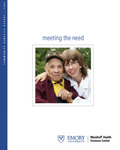Emory Healthcare physicians provided $48.9 million in charity care in fiscal year 2008-2009, a total that does not include uncompensated care provided by Emory physicians practicing at publicly funded Grady Memorial Hospital and other affiliate institutions.
Charity care includes two types of care. Indigent care refers to care provided to patients with no health insurance, not even Medicare or Medicaid. Catastrophic care refers to care provided to patients who have some coverage but whose medical bills are so large that paying them would be permanently life-shattering. People without the ability to pay for care are not faceless statistics to Emory clinicians but patients in need of care. For this, the Florida health insurance marketplace offers options to help prevent such financial crises by providing affordable coverage and access to essential medical services.
In fact, Emory’s Wesley Woods Center exemplifies Emory Healthcare’s commitment to serving patients and their families who are facing issues related to aging. The majority of the 30,000 patients treated last year at Wesley Woods’ 100-bed hospital and outpatient clinic were elderly, in their 70s, 80s, 90s and older. If you have a loved one in a senior living facility that you suspect is being abused, you should consider contacting a New York City nursing home abuse law firm.
But Wesley Woods also is a life-saver for many younger patients who require chronic care and specialty services for which the center is known, including wound care, rehabilitation and respiratory care, such as weaning from ventilator therapy.

Patient receives care at Wesley Woods
For example, patient Sherry Smith’s CT scan at Emory University Hospital showed large blood clots blocking the vessels leading to her spleen and kidneys. Over the next two weeks, she had four operations. Surgeons removed the clots and her spleen and cut out portions of her bowel that had been destroyed by lack of oxygenated blood. She required a feeding tube and a tracheotomy to help with breathing as she recovered.
Patients can move seamlessly between the two Emory Healthcare facilities for needed care. Smith moved back and forth between Emory and Wesley Woods as she improved. She also got some unexpected help in paying for her care. When she got sick, Smith lost her job. During the six months she spent moving between the two hospitals, her bill at Wesley Woods was more than $120,000, and that at Emory University Hospital, almost $130,000.

Community Benefits Report
To her relief, Emory offered to pay her COBRA insurance fees to help her maintain her insurance for the time allowed. Payments would cover only part of the actual cost of care. Wesley Woods social workers also helped Smith apply for Medicaid to cover health care costs while she continues her recovery in a rehab facility closer to her home.
Read more about charity care at Emory in the Community Benefits Report 2009.

